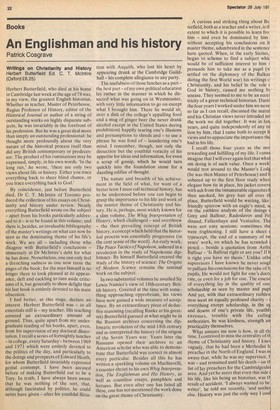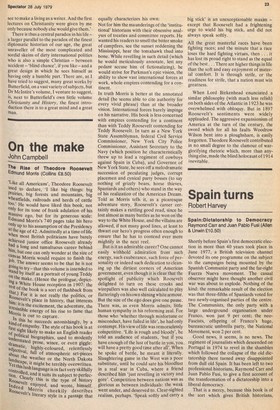Books
An Englishman and his history
Patrick Cosgrave
Writings on Christianity and History Herbert Butterfield Ed, C. T. McIntire (Oxford £6.25) Herbert Butterfield, who died at his home in Cambridge last week at the age of 78 was, in my view, the greatest English historian. Whether as teacher, Master of Peterhouse, Regius Professor of History, editor of the Historical Journal or author of a string of outstanding works on highly disparate subjects, he was invariably in the forefront of his profession. But he was a great deal more than simply an outstanding professional: he thought more profoundly about the very nature of the historical process itself than did any British contemporary or predecessor. The product of his ruminations may be expressed, simply, in his own words. 'In the long run,' he wrote, 'there are only two views about life or history. Either you trace everything back to sheer blind chance, or you trace everything back to God,' By coincidence, just before Butterfield died, Dr C. T. McIntire of Toronto produced the collection of his essays on Christianity and history under review. Nearly everything Butterfield wrote on the subject — apart from his books particularly addressed to it — is to be found in this volume; and there is, besides, an invaluable bibliography of the master's writings on what can now be seen as the dominating theme of his life's work. We are all — including those who disagree with Butterfield's conclusions — immensely in Dr McIntire's debt for what he has done. Nonetheless, one can only feel a drenching sadness as one now turns the pages of the book; for the man himself is no longer there to look pleased at its appearance, deft and cackling to turn aside criticisms of it, but generally to show delight that his last book is entirely devoted to his main obsession.
I had better, at this stage, declare an interest. Herbert Butterfield was — in all essentials still is — my teacher. His teaching covered an extraordinary amount of ground. Thus, quite apart from my undergraduate reading of his books, apart, even, from his supervision of my doctoral dissertation, I recall a series of fortnightly lunches — in college, every Saturday—between 1969 and 1971 which were entirely devoted to the politics of the day, and particularly to the doings and prospects of Edward Heath, for whom Butterfield invariably expressed genial contempt. I have been accused before of making Butterfield out to be a Tory. In truth, I have always been aware that he was nothing of the sort, that, although fascinated by politics, he could never have given — after his youthful flirta tion with Asquith, who lost his heart by appearing drunk at the Cambridge Guildhall — his complete allegiance to any party.
The usefulness of those lunches as a part — the best part — of my own political education lay rather in the manner in which he dissected what was going on in Westminster, with very little information to go on except what I brought him. There he would sit, over a dish of the college's appalling food and a mug of ginger beer (he never drank alcohol except in the United States during prohibition) happily tearing one's illusions and presumptions to shreds and — to use a phrase he was fond of — laundering one's mind. I remember, though, not only the dissection but the youthful voracity of his appetite for ideas and information, for even a scrap of gossip, which he would turn quickly into the foundation stone for a dazzling edifice of thought.
The nature and breadth of his achievement in the field of what, for want of a better term I must call technical history, has to be understood before one can begin to grasp the importance to his life and work of the master theme of Christianity and history. He is, perhaps, most widely known for a slim volume, The Whig Interpretation of History, which challenged — and overthrew — the then prevailing concept of British history, a concept which held that the historical process was essentially progressive (in the cant sense of the word). An early work, The Peace Tactics of Napoleon, ushered in a revolution in the study of Napoleonic diplomacy. By himself Butterfield created the study of the history of science: The Origins of Modern Science remains the seminal work on the subject.
In two substantial volumes he assailed Sir Lewis Namier's view of 18th-century British history. Greeted at the time with something approaching opprobrium, his views have now gained a wide measure of acceptance, By an extraordinary piece of deductive reasoning (recalling Ranke at his greatest) Butterfield guessed at what might be in the Russian archives concerning the diplomatic revolution of the mid-18th century and re-interpreted the history of the origins of the Seven Years war. Years later the Russians opened their archives to an American scholar who was able to demonstrate that Butterfield was correct in almost every particular. Besides all this he has written a sparkling volume on Machiavelli, a counter-thrust to his own Whig Interpretation, The Englishman and His History, as well as countless essays, pamphlets and lectures. But even after one has listed all these, one has not mentioned the work done on the great theme of Christianity. A curious and striking thing about Bu terfield, both as a teacher and a writer, is ti extent to which it is possible to learn fro him — and even be dominated by him without accepting his conclusions on h master theme, adumbrated in the sentence have quoted. When, in the early Sixties, began to scheme to find a subject whi would be of sufficient interest to him I persuade him to take me as a pupil (ss settled on the diplomacy of the Baikal during the first World war) his writings c Christianity, and his belief in the role God in history, caused me nothing b unease. They seemed to me to be an ecce tricity of a great technical historian. Duri the four years I worked under him we nev so far as I can recall, discussed the matt and his Christian views never intruded in the work we did together. It was in lat years, and quite independently of any t tion by him, that I came both to accept views and to appreciate the importance th had in his life.
I recall those four years as the mo rewarding and fulfilling of my life. I cum( imagine that I will ever again feel that wha am doing is of such value. Once a week would trot around to the Master's LodE (he was then Master of Peterhouse) and t. ushered up to the first floor study wher elegant bow tie in place, his jacket cover with ash from the innumerable cigarettes then smoked, his grey hair all over t place, Butterfield would be waiting, like friendly sparrow with an eagle's mind, s( on the ruthless analysis of the doings Grey and Balfour, Radoslavov and Fe dinand, Falkenhayn and Venizelos. Th were not easy sessions: sometimes th were frightening. I still have a sheet typescript, the end of a summary of t years' work, on which he has scrawled pencil — beside a quotation from Arth Balfour — 'Is Balfour right or are you? If is right you have no thesis.' Unlike oth supervisors I have known he never sougt to palliate his conclusions for the sake of h pupils. He would not fight for one's doct rate, or even for a job for one. The essen of everything lay in the quality of one scholarship as seen by master and pup And yet, with that extraordinary ruthles ness went an equally profound charity — everything except scholarship, in the u and downs of one's private life, youthf excesses, trouble with the colle authorities, he was kindness, strength a practicality themselves.
What amazes me now is how, in all th time,! contrived to miss the centrality of tl theme of Christianity and history. I kne vaguely, that he had been a Methodist I preacher in the North of England. I was n aware that, while he was my supervisor, was — and remained until his death — on t list of lay preachers for the Cambridgeshi area. And yet he avers that even this side his life, like his being an historian, was result of accident. 'I always wanted to be writer', he told me recently, 'and nothi else. History was just the only way I cou see to make a living as a writer. And the first lectures on Christianity were given by me only because nobody else would give them.'
There is thus a central paradox in his life — a larger parallel to the paradox of the finest diplomatic historian of our age, the great unraveller of the most complicated and sordid skeins of dirty international politics who is also a simple Christian — between accident — 'blind chance', if you like — and a great design in which he sees himself as having only a humble part. There are, as I have tried to suggest, many great works by Butterfield, on a vast variety of subjects, but Dr McIntire's volume, I venture to suggest, Is, next to Butterfield's own little volume Christianity and History, the finest introduction there is to a great mind and a great man.







































 Previous page
Previous page